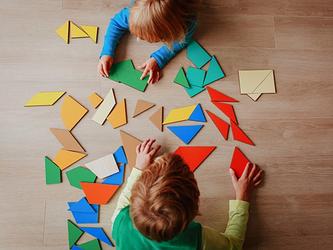Making a play: How Mattel understands children
Video calls must be de rigueur for Michael Swaisland. Based in Germany, as head of insights for Europe, Middle East and Africa (EMEA) at toy company Mattel, his role covers a huge, diverse geographic area.
When we meet virtually, the set-up has become the norm across the board. While video has simplified cross-border communication, however, understanding multiple markets, where tastes, cultures and languages vary, is still a complex job – and, for Swaisland, it’s increasingly about “listening, rather than asking”, particularly this year.
The EMEA insights function at Mattel is split across two tiers – in-country local market experts, and a regional layer focused on core pillars, including consumer, shopper, media insights and advanced analytics.
“From an insights function perspective, because we work across the region and locally, our focus is on how to get the best impact in-market for the countries, but also feeding back to global to say what they need to do differently for our region,” says Swaisland. “Because it’s not the same as America, let’s put it that way.”
Mattel operates in more than 100 markets globally, and its portfolio of toy brands – including Barbie, Fisher-Price, Hot Wheels and Thomas & Friends – is just as diverse as the countries it covers.
The variety of markets and products drives a lot of the bigger insight projects run by Swaisland’s team, as it seeks to understand specific implications by market or region.
The issue of sustainability, a topic of increased focus for large multinationals, is one example. Globally, Mattel’s head of sustainability, based in the US, leads initiatives in the space, but, for Swaisland, the focus is on establishing what’s different in terms of parents – and children – in Europe.
“There’s a large focus on what we can do better and what more we can learn around sustainability, not just from a product-pack perspective, but what it means to kids,” says Swaisland.
“We’ve done some work primarily in the Nordics, because it is more advanced in that area than most of the region – kids living in that part of the world have 10 bins for their recycling, whereas most countries have one to three.”
The research – which was not carried out for one particular brand, but to inform Mattel in general – also sought to explore how children are learning about sustainability; whether their knowledge comes from parents, teachers or elsewhere.
“YouTube has a huge impact,” says Swaisland. “They’re hearing about things going on in the world, told from the perspectives of other kids. It’s a valuable lesson for us; in the world of kids, there’s so much that comes from each other – good or bad. We need to harness the things that are good.”
The Nordic study will eventually inform how sustainability can be embedded into Mattel’s strategies and broader goals, as well as influencing how the company conducts more research in the space.
Capturing imagination
Another area of focus for Swaisland’s team is driving more purpose in Mattel’s brands, particularly Barbie, which has had an increased drive towards inclusion in recent years, adding gender-neutral and disabled dolls to its product line. In early 2021, it launched Maya Angelou and Eleanor Roosevelt dolls as part of its ‘Inspiring Women’ series.
“We do a lot of work looking at who are icons and role models – who are the people that kids either do know or should know because of the impact they’ve had on society,” says Swaisland.
Swaisland’s team has done a lot of work on Barbie to explore the benefits of playing with dolls, working with the Cardiff University to conduct a neuroscience study to explore what’s happening in children’s minds while they’re playing – a step into academia that was new for the company.
The paper ‘Exploring the benefits of doll play through neuroscience’ was published in the Frontiers in Human Neuroscience journal in October 2020, after two and a half years of work.
For Mattel, the research focused on setting a benchmark for the benefits of play. “We know it works from our observational work over the years – we can see how kids act out stories when they’re playing with dolls and go into another world – but there wasn’t any academic proof to suggest something was happening.”
One of the findings was that playing with dolls activates the posterior superior temporal sulcus, the part of the brain known to help with social information processing, such as empathy. This occurred even when the child was playing alone, and the effect was equal for boys and girls.
It was a “huge” finding for Mattel, explains Swaisland, as it helped to validate the hypothesis on the importance of play. “A lot of the time, parents in the past would say to us: ‘I don’t see the benefit, I don’t see what comes out of play because it’s invisible.’ Imagination is in that child’s head, it’s part of their development, but it’s not like drawing or building a car; those are physical manifestations of development.
“But we knew this hidden learning and development was critical. EQ [emotional intelligence] is becoming so much more important from an adult’s perspective, and if we can foster that more in the kids of tomorrow, for us that’s a great win.”
After the academic study, Mattel commissioned a survey with parents [see ‘Who cares about empathy?', below] to explore the implications and relevance of the findings.
The results of the Cardiff study are being used to inform Barbie’s brand communications and how it conveys the empathy message. A social media campaign in December focused on “bringing the information from the research to life”, says Swaisland, but he admits it will be a “slow-drip process”.
“It’s not something you can convince people of overnight, but I think the importance is that the message is rooted in science; it was impartial; all decisions were led by Cardiff, we were just a recipient. We knew the results could have come back and told us nothing. That’s the risk you take with academic work – it’s not about ‘here’s a questionnaire, answer some questions’; it’s about fundamental human truths.”
Building curiosity
Swaisland feels that the closer the insights team stays to children, the more it can build curiosity within the business. One of its aims is to encourage people to ask more questions, as opposed to merely requesting sales data or a consumer profile. “Know your consumer, know that child, know that parent. That’s what we’re trying to get more focus on,” he says.
Swaisland sees research as an “enabler” for the team to drive impact, doesn’t want it to be “gathering dust in a folder somewhere”, and is interested in how to be discerning with research, and not simply sticking to tried-and-tested methods.
One of the EMEA insight function’s priorities has been “optimising” people working in the team, and leveraging its specialists across the region, rather than generalists “trying to do everything”, according to Swaisland.
In line with this, Mattel has changed how it works with research suppliers over the past couple of years. While it still works with large multinational agencies, it now has a broad portfolio of suppliers, including individual specialists in a given space – for example, empathy, or small qualitative agencies that are “really good at diversity and inclusion”, says Swaisland.
Like many, Swaisland saw hugely increased demand on his function as a result of the pandemic, as the business dealt with uncertainty. With the behaviours of the year not following normal patterns, the team was in continual dialogue with finance, sales and marketing, and supply chain functions – often having conversations with people they might not have engaged with frequently in the past – to understand more about what might happen, particularly around the toy industry’s all-important fourth quarter.
“There were lots of questions around how people would behave,” says Swaisland. “What we did through the year was try to hypothesise – would people shop earlier? Would Christmas take place differently – if you’re not seeing friends and family, would you buy less stuff? A lot of different scenario planning went into that.”
He adds: “The main thing we’ve probably learned from the past year is resilience. Insight teams are at the focus and centre of a lot more decisions.”
Beyond Mattel, Swaisland would like to see the insights community exploring how to foster more change in the world of research – and wonders if the industry places enough focus on the diversity of the function, in terms of the individual roles involved.
“There are lots of specialist roles today, and there are probably insight roles coming up in the next few years that we don’t expect yet – in AI, for example. How do we reframe what the market research world is?
“We often think our stakeholder is marketing and sales, but actually it’s the full organisation, and I think we need to make sure we, as individuals, are realising that.”
Who cares about empathy?
To understand the relevance of the findings of its neuroscience study with Cardiff University, Barbie commissioned OnePoll to conduct a survey of 15,000 parents across 22 countries in July 2020.
The research found that 91% of parents ranked empathy as a key social skill that they would like their child to develop.
While only 26% were aware that playing with dolls could help with these skills, 74% claimed they would be ‘more likely’ to encourage their child to play with a toy if they knew it would help them develop social and emotional skills.
Parents were also worried about their children’s social development skills during the pandemic – 70% of respondents reported that they were concerned about how the isolation may affect their child and their interaction with others.
Swaisland says the survey helped to “solidify” the results of the Cardiff research. “More than 90% of parents felt that developing empathy was really important to developing their children’s futures, but a much lower percentage believed that playing with dolls could actually develop that.
“So, it shows that it’s something that we need to really use over the years to help them understand how they can improve this.”
After the research, Barbie launched an online hub – including resources for parents, caregivers and children – aimed at assisting children’s social-processing skills.
This article was first published in the April 2021 issue of Impact.

We hope you enjoyed this article.
Research Live is published by MRS.
The Market Research Society (MRS) exists to promote and protect the research sector, showcasing how research delivers impact for businesses and government.
Members of MRS enjoy many benefits including tailoured policy guidance, discounts on training and conferences, and access to member-only content.
For example, there's an archive of winning case studies from over a decade of MRS Awards.
Find out more about the benefits of joining MRS here.














0 Comments